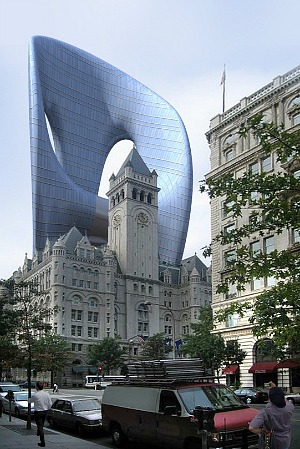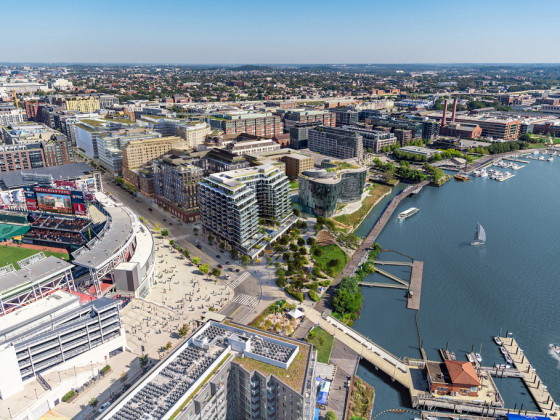What's Hot: Did January Mark The Bottom For The DC-Area Housing Market? | The Roller Coaster Development Scene In Tenleytown and AU Park
 Don't Disturb the Skyline: Public Responds to Height Master Plan
Don't Disturb the Skyline: Public Responds to Height Master Plan
✉️ Want to forward this article? Click here.

Not what DC would look like if the Height Act was lifted.
On Monday night, officials from the Office of Planning (OP) and the National Capitol Planning Commission (NCPC) held their first public meeting on the city’s Height Master Plan. Stations and representatives were scattered across a room at the Petworth Library, so that attending residents could examine the questions posed by the study and voice their comments directly to organizers. There was also a short presentation.
While the officials made clear that they are not close to making any conclusions and are still in the studying phase, several residents came to the meeting to express concern about the prospect of taller buildings in the city. “Please don’t disturb the skyline!” one pleaded.
Office of Planning Director Harriet Tregoning was quick to dismiss fears that DC would become a shadow-y high-rise-filled city. “We’ll never have Manhattan-type heights,” said Tregoning. Further, said Tregoning, the study will focus on parts of the city that are already designated as “high-density” by the current comprehensive plan, so neighborhoods with one-story buildings and four-story rowhouses are not likely to change.
As we mentioned on Monday, the primary focus of this study is to identify which parts of the city are of federal interest, with the hope that those areas that are not can be liberated from the federal height limit law and governed solely by local agencies.
The meeting also offered a few more specifics of the study. For instance, the modelling project will look at the city from three perspectives: a panoramic view, a skyline study of both L’Enfant City and the Topographic Bowl (the area outside of Florida Avenue), and on the street level. There was also more information on the comparative city study; the NCPC and OP are looking closely at the height solutions of a few major cities around the world. In London, for example, the city kept height restrictions in spiky, narrow areas leading to St. Paul’s Cathedral to maintain sightlines of the monument. In Vancouver, heights are limited to maintain views of the mountain range in the background.
Here are a few of the questions that the OP and the NCPC are grappling with, and on which they hope to solicit commentary from the public:
- If it were possible to add height to parts of the District, where would that be?
- Right now, the skyline is punctuated with federal structures. Could DC have room for private buildings in the skyline, as prominent landmarks?
- Which landmarks should be prominent?
- Which views are most important to protect?
- How would the National Mall, historic buildings, and major public spaces be impacted if the buildings surrounding them were taller?
- What the the economic impacts of height adjustments?
In addition to several more public meetings in the coming months, residents can leave comments on NCPC’s site. The NCPC and OP hope to compile recommendations to give to Congress in the Fall.
See other articles related to: dclofts, harriet tregoning, height act, national capitol planning commission
This article originally published at http://dc.urbanturf.production.logicbrush.com/articles/blog/height_master_plan_meeting_raises_questions/7063.
Most Popular... This Week • Last 30 Days • Ever

As mortgage rates have more than doubled from their historic lows over the last coupl... read »

The small handful of projects in the pipeline are either moving full steam ahead, get... read »

Lincoln-Westmoreland Housing is moving forward with plans to replace an aging Shaw af... read »

The longtime political strategist and pollster who has advised everyone from Presiden... read »

A report out today finds early signs that the spring could be a busy market.... read »
DC Real Estate Guides
Short guides to navigating the DC-area real estate market
We've collected all our helpful guides for buying, selling and renting in and around Washington, DC in one place. Start browsing below!
First-Timer Primers
Intro guides for first-time home buyers
Unique Spaces
Awesome and unusual real estate from across the DC Metro













